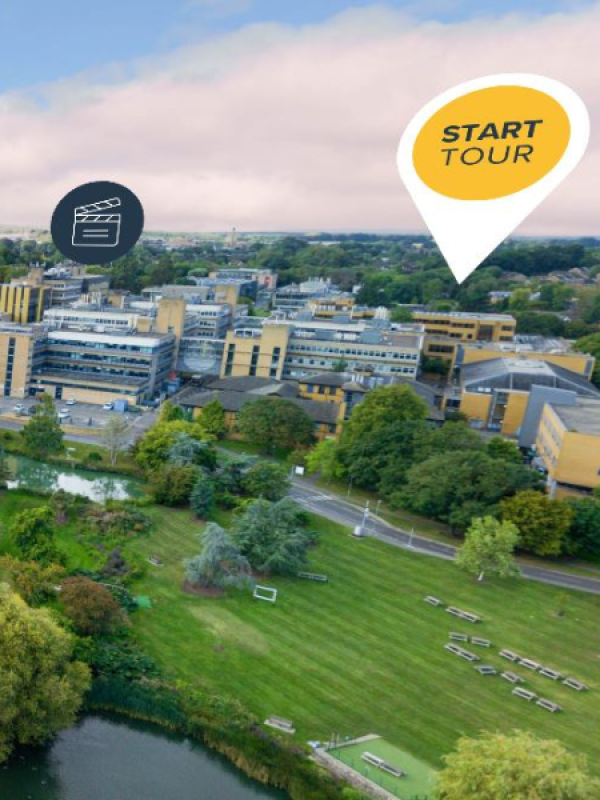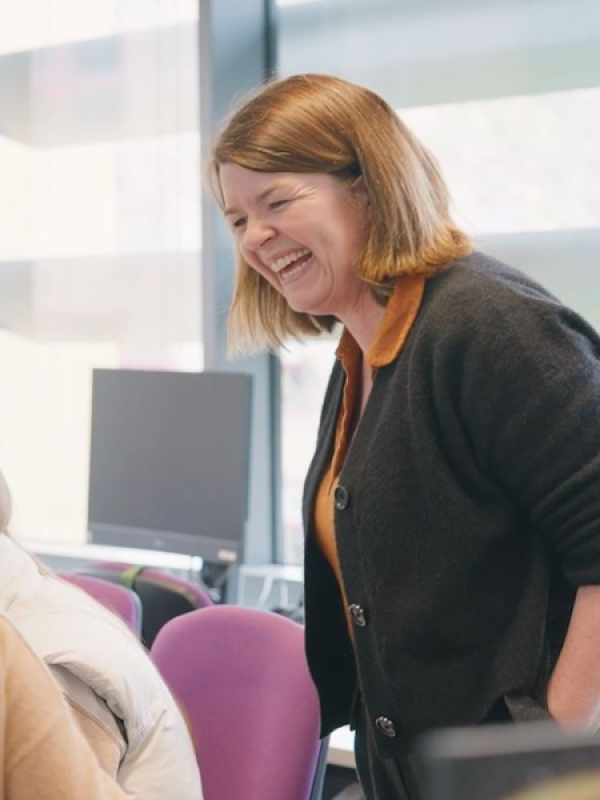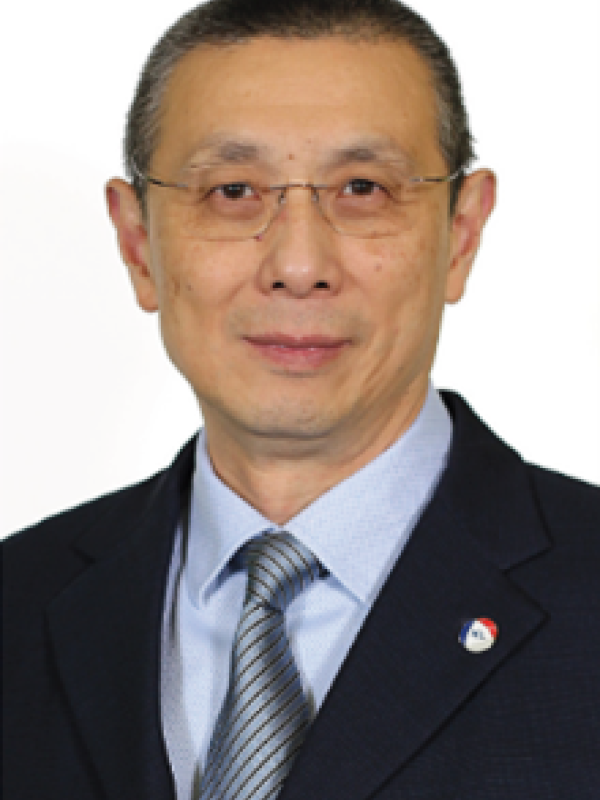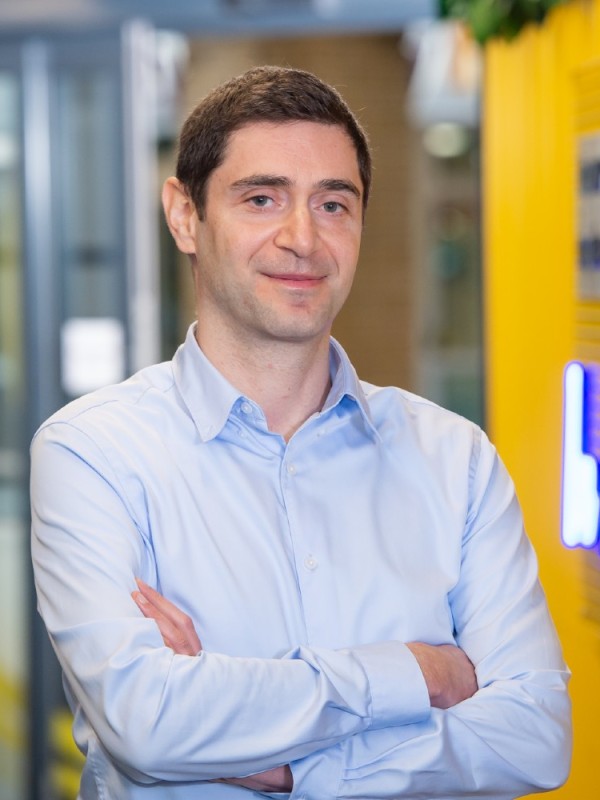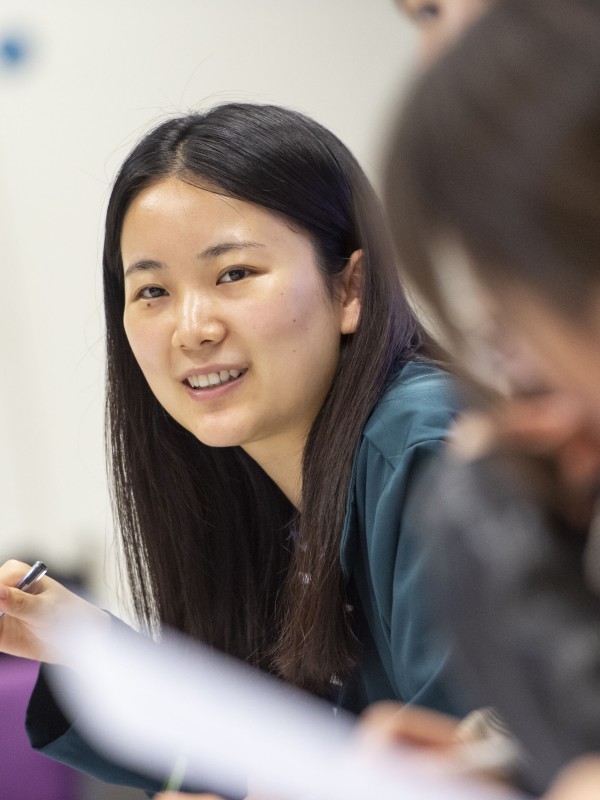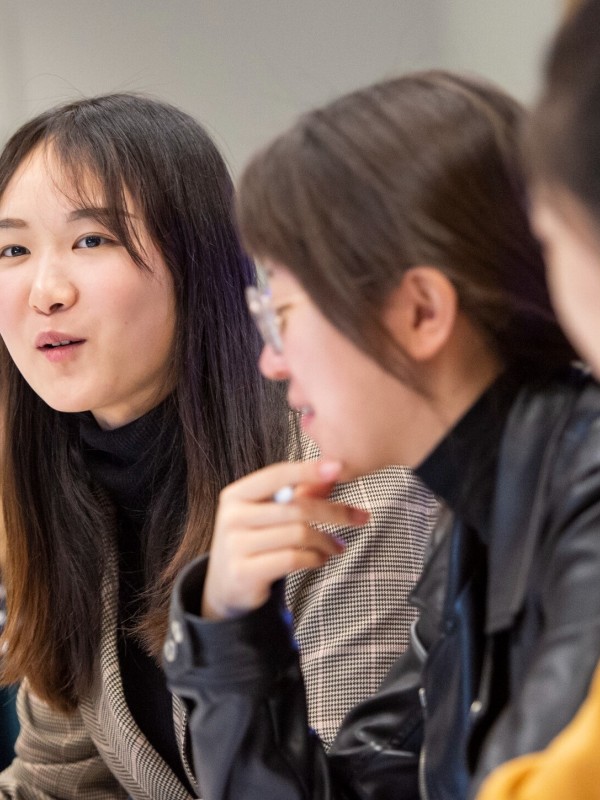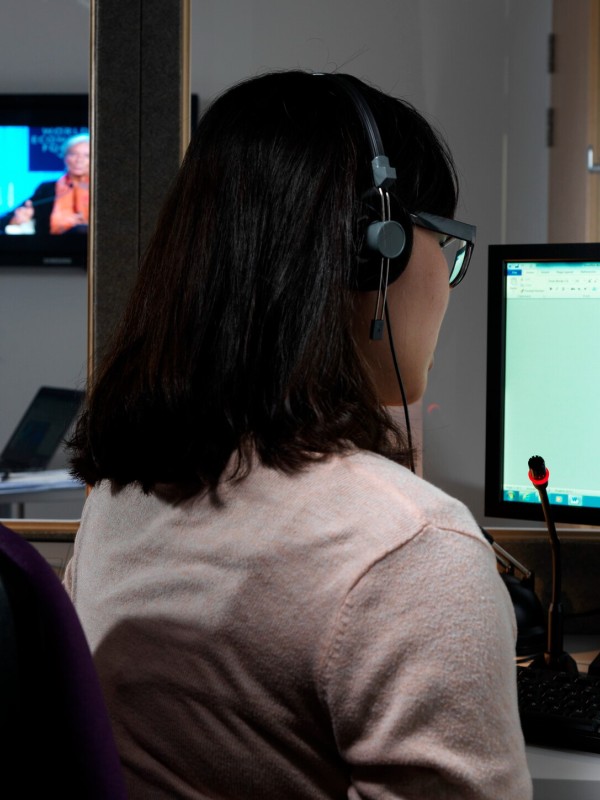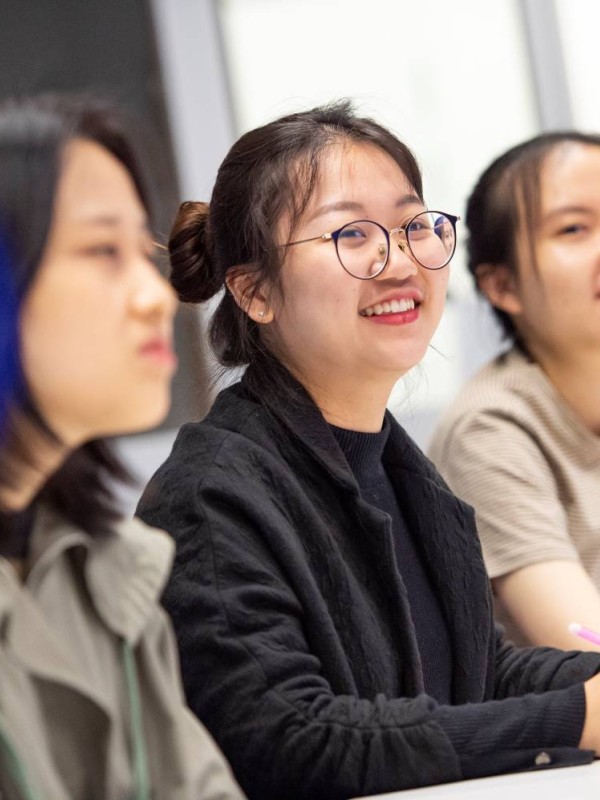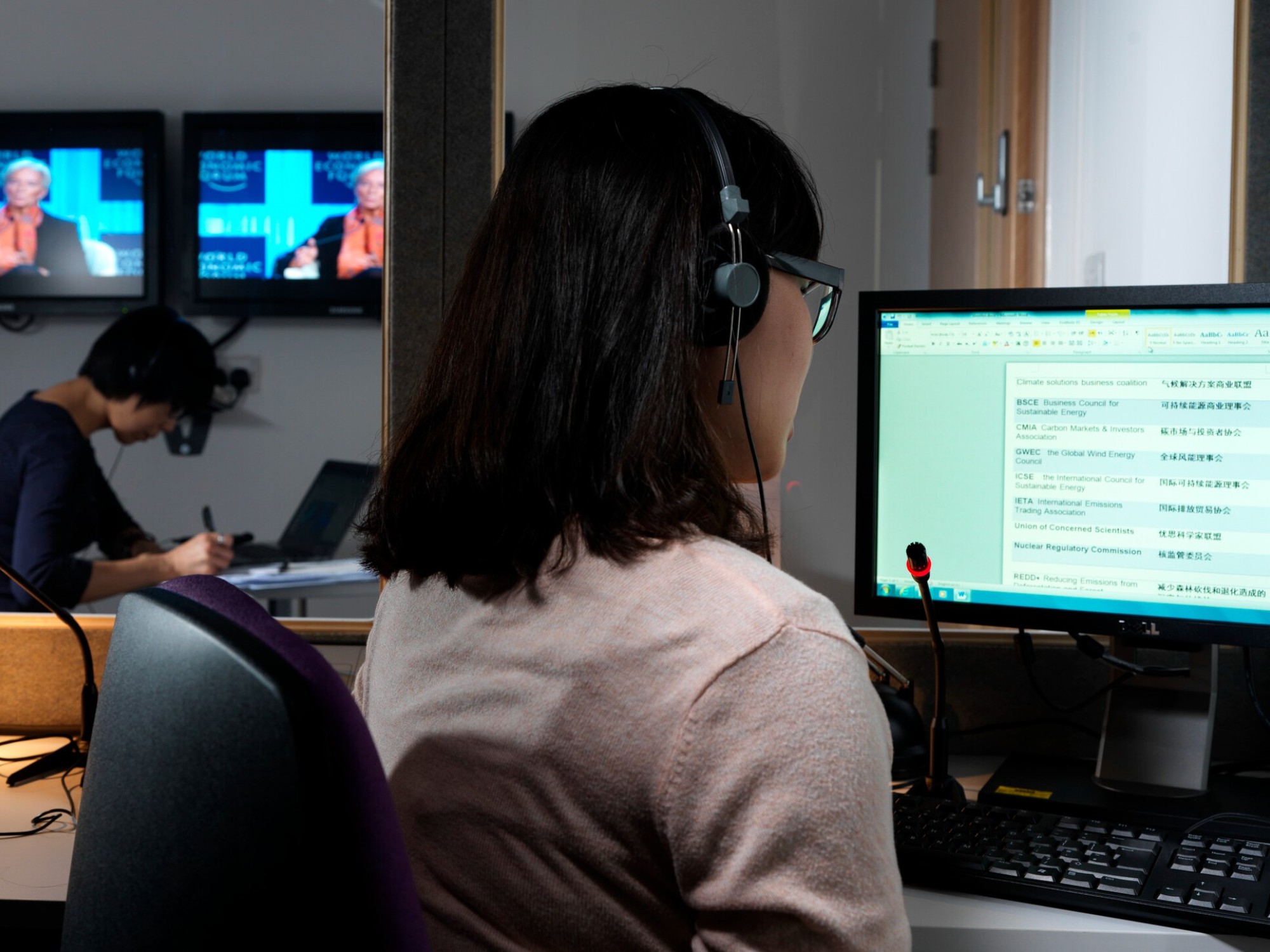
- Interpreting, Technology and AI
MA — 2025 entry Interpreting, Technology and AI
Join the UK’s only course which helps you develop advanced skills across all interpreting modes—consecutive, simultaneous, dialogue and distance interpreting. Learn from internationally recognised experts in the field of interpreting technology to gain proficiency in remote/distance interpreting and in the use of AI-enabled speech and language technologies to prepare for the future of interpreting in a rapidly evolving industry.
Why choose
this course?
- Surrey’s Centre for Translation Studies (CTS) is one of the UK’s top translation and interpreting research centres, with over four decades of experience in postgraduate education and research training.
- Our course has a strong, language-pair-specific practical component and explores emerging areas of the discipline, including different forms of audio/video-mediated remote or distance interpreting, hybrid modalities of interpreting and audiovisual translation (e.g. live subtitling), and AI.
- As a UK centre of excellence in interpreting studies, supported by the Surrey Institute for People-Centred AI, our teaching is guided by our leading research on integrating professional interpreting practices with AI-driven technologies such as neural machine translation, speech technologies and generative AI (e.g. ChatGPT).
- We support internships and professional development activities, which will enable you to collaborate with language service providers and build a professional engagement portfolio that you can present to future employers.
Statistics
Fantastic graduate prospects
97% of our Literature and Languages postgraduate students go on to employment or further study (Graduate Outcomes 2024, HESA)
10th for research impact
The Research Excellence Framework (REF) 2021 ranked 10th for research impact
4th in the UK
For Languages and Linguistics in the Guardian University Guide 2025
What you will study
Our MA Interpreting, Technology and AI course has both a multilingual and a Chinese pathway.
On this multilingual pathway we regularly offer Arabic, Chinese (Mandarin), French, German, Greek, Italian, Korean, Norwegian, Polish, Portuguese, Romanian, Russian, Spanish, Swedish and Turkish paired with English. Many other languages are available upon request, subject to a minimum number of students.
You will develop professional skills in all interpreting modes (consecutive, dialogue and simultaneous interpreting, and sight translation) and practise both on-site interpreting and remote/distance interpreting via audio/video link including remote simultaneous interpreting. Guided by professional interpreters and experienced academics, you will cover a variety of specialisms (e.g., business, legal, scientific, technical and medical domains), as you develop a solid grounding in the linguistic, cognitive, quality-related, social and ethical dimensions of interpreting. You will also learn to understand, discuss and justify interpreting-related decisions.
Uniquely, our course emphasises the integration of cutting-edge technologies into the interpreting workflow, e.g. to support the interpreter’s preparation and real-time performance (such as electronic glossaries, digital note-taking, automatic speech recognition, machine translation and generative AI) and the delivery of interpreting services (audio/video-mediated remote/distance interpreting). With the Centre for Translation Studies (CTS)’ leading research track record in interpreting technologies, you will gain a critical understanding of the role of different digital technologies and AI in today’s language services industry, empowering you to use these tools effectively and responsibly in your interpreting practice.
Simultaneous interpreting practice takes place in our top-tier interpreting facilities, including two interpreting suites with ISO-standard soundproof booths—identical to those used by major international organisations and connected to videoconferencing platforms for remote interpreting. While our interpreting suites support professional-level practice, our virtual platform supports digital audio and video recording and gives you access to teaching materials and resources to practise.
Optional modules enable you to explore public service interpreting, audiovisual translation and hybrid practices such as live subtitling, allowing you to customise your learning experience according to your own strengths, personal interests and career ambitions.
Our flexible dissertation options enable you to choose from :
- A research-based dissertation on a specific interpreting topic
- An extended interpreting project accompanied by a reflective analytical commentary
- A critical report based on a language-industry work placement or a skills-enhancement activity (such as a summer school or similar).
During the course, academic and professional excellence will be rewarded with the following prizes:
- RWS Campus Top Student Award (two Trados licenses)
- Project management training (one free-of-charge place in the Pro PM Training and Certification Programme)
- Professional Engagement Portfolio Prize
- Best Performance in Translation Prize.
An international community
Our course attracts students from all over the world, fostering a vibrant, multilingual and multicultural international community. Our MA cohorts blend recent graduates and more mature students, with diverse backgrounds and experience.
A future-proof education
Our MA Interpreting, Technology and AI equips you with core interpreting and technological skills, along with skills in note-taking for consecutive interpreting, public speaking, terminology management, and other specialised services. Industry-focused and informed by CTS’s leading research, our course trains you in interpreting to a high professional standard while effectively using automatic speech recognition (ASR), neural machine translation (NMT) and large language models (LLMs). . You will explore the quality and usability of AI-powered language tools, and gain an introduction to natural language processing (NLP). You will also explore corpus linguistics techniques for terminology extraction and bilingual term compilation, hybrid modalities of translation/interpreting such as live subtitling and speech-to-text, the specific requirements for public service interpreting, and the translation of audiovisual content for diverse audiences.
With strong expertise in interpreting technologies, our graduates are well prepared to succeed in today’s interpreting and technology markets, adapt to evolving language services, and meet future market needs.
Professional development
Our course equips you with the interpreting, technological, business, interpersonal and essential soft skills for a successful career in the language services industry.
You will learn through a combination of regular language pair-specific practice, simulations of real-world multilingual events (mock conferences, guided campus tours and distance interpreting). Our experienced academic staff will guide you through current and future industry challenges, while well-established, professional interpreters bring first-hand knowledge, industry standards, and up-to-date market insights directly into the classroom.
Through regular seminars with guest speakers (e.g., translators, interpreters, users of language services and researchers), you will gain further insights into the profession and the latest interpreting research. Our annual CTS careers fair connects our MA students with local and international language service and technology providers, supporting professional networking, while work placements provide first-hand industry experience.
You will receive guidance on developing a professional engagement portfolio to help you build a professional CV as you study. This includes documenting your collaborations with language services providers (e.g., work placements, volunteer interpreting) and other extra-curricular activities (such as joining a professional association or attending a professional development workshop).
You will also have invaluable opportunities to apply and refine your interpreting skills in real-life settings. Our students have interpreted at various multilingual events at the University, from graduation ceremonies to workshops and conferences. Our students visit events and international organisations such as the International Maritime Organisation (IMO) in London, a specialised agency of the United Nations, where they shadow professional interpreters and familiarise themselves with professional interpreting environments. These opportunities will prepare you to work as a freelancer or at international organisations, government bodies, or private companies.
Industry links
We have forged close links with the main professional bodies in the language industry. For example, we are part of the prestigious Higher Education Partnership of the Chartered Institute of Linguists (CIOL) and a corporate member of the Institute of Translation and Interpreting (ITI). You can join these bodies as a student member during the course and become a full member after you graduate.
After graduating from our MA Interpreting, Technology and AI course, you will be able to have your interpreting modules recognised towards application for membership of the National Register of Public Service Interpreters.
We also collaborate with the Translation Automation User Society (TAUS), the European Language Industry Association (ELIA), and the Globalization and Localization Association (GALA), which enables you to apply for a work placement with various translation and interpreting partner companies. We have close links with many language service providers, and have an extensive network of visiting professionals, so you will benefit from excellent connections and be taught to industry standards.
The MA Interpreting, Technology and AI course can only be taken on a full-time basis. The taught part of the programme is divided into eight 15-credit modules. A 15-credit module is indicative of 150 hours of learning. The hours of learning comprise of contact hours, guided learning and private study.
The MA course has six compulsory modules, and you must select another two optional modules.
Our varied offer of optional modules will enable you to tailor the programme to your personal strengths and preferences. Students normally take four modules in Semester 1 and four in Semester 2.
You will complete your degree with an Interpreting, Technology and AI Dissertation (60 credits), to be submitted at the beginning of September.
The structure of our programmes follows clear educational aims that are tailored to each programme. These are all outlined in the programme specifications which include further details such as the learning outcomes:
Modules
Modules listed are indicative, reflecting the information available at the time of publication. Modules are subject to teaching availability, student demand and/or class size caps.
The University operates a credit framework for all taught programmes based on a 15-credit tariff, meaning all modules are comprised of multiples of 15 credits, up to a maximum of 120 credits.
Course options
Year 1
Semester 1
Compulsory
This module provides students with little or no previous experience of interpreting with a hands-on introduction to interpreting and with the practical skills and knowledge required to perform consecutive interpreting tasks (with and without note-taking) into the student's A language effectively in a wide range of communicative scenarios (e.g. conference/business/media settings, international institutions).
View full module detailsThis module provides students with little or no previous experience of interpreting with a hands-on introduction to simultaneous interpreting into their A language and with the practical skills and knowledge required to perform simultaneous interpreting tasks effectively in relevant communicative situations. The module takes place in professionally equipped, ISO-certified simultaneous interpreting labs. The focus is on interpreting in a wide range of communicative scenarios (e.g. conference/business/media settings, international institutions).
View full module detailsThis module provides students with a systematic framework for understanding key concepts in Translation and Interpreting Studies and how they relate and apply to the rest of the programme and to everyday professional practice. The module enables students to confront a wide range of translation and interpreting challenges, from the lack of equivalence between languages and cultures to contemporary technological, ethical and societal issues affecting translation and interpreting practice, including the rapidly evolving use of machine translation and artificial intelligence (AI). The module equips students with both a solid grounding in the guiding principles of translation and interpreting, derived from scholarly engagement with the discipline, and the strategies required to engage in best practices in the profession and future career development. Taking a holistic approach to translator and interpreter education, the module consists of lectures and seminars that discuss the main principles and challenges of translation and interpreting, and explore solutions in close alignment with other modules in the programme. Students complement lectures and seminars with practical exercises and independent reading.
View full module detailsOptional
This module provides students with little or no previous experience of interpreting with a hands-on introduction to interpreting and with the practical skills and knowledge required to perform consecutive interpreting tasks (with and without note-taking) into the student’s A language effectively in a wide range of communicative scenarios (e.g. conference/business/media settings, international institutions).
View full module detailsThis module is an introduction to the practice of translation with the support of the most advanced technologies available, focusing on the demand for translators to possess expert skills to be in command of their performance and in control of the outputs of their work. The module is informed by the evolution of requirements of professional translation, namely under the influence of advanced technologies like machine translation. The focus of the module is on the interaction between translators and the computer tools that they use.
View full module detailsThis module introduces students to the fundamentals of Artificial Intelligence (AI) and its applications in the field of translation and interpreting. The course will cover a wide range of topics, from the basic concepts of AI to more advanced areas and techniques including machine learning, large language models (LLMs) and LLM leveraging and customisation of automatic speech recognition (ASR) engines. Students will be taught different prompting techniques which allows them to interact with LLMs like ChatGPT, so they can develop advanced problem-solving skills. Students will tackle AI-related tasks that are relevant in the fields of translation and interpreting, such as machine translation, customisation of ASR engines and the use of machine assistance in tasks requiring creativity skills (e.g. transcreation). They will also explore the ethical implications of AI and the potential impact of AI on the future of the language industry. Through a combination of theoretical lectures and practical exercises, students will gain hands-on experience with AI tools and techniques. They will learn how to use AI to improve their own translation and interpreting skills, as well as how to develop innovative AI-powered solutions for the language industry. Practical sessions will give participants hands-on experience in LLM prompting and using other AI-powered tools individually and in teams. The practical sessions will greatly enhance students¿ problem-solving skills, resourcefulness and their ability to identify problems, suggest alternative solutions and evaluate the outcomes of original methods used. This module is suitable for students with a variety of backgrounds, including those with no prior knowledge of AI. It is particularly relevant to students interested in translation, interpreting, language technology, and computational linguistics.
View full module detailsSemester 2
Compulsory
This module introduces students to the principles and practical implications of using different technologies in the interpreting profession. It addresses the impact of technology on the interpreting process and product, and on the delivery of interpreting services in the 21st century. The module explores the use of technological tools and resources such as electronic corpora and databases for background research and preparation, the role of communication technologies such as videoconferencing to support different modalities of remote interpreting (distance interpreting), the use of artificial intelligence (AI)-powered tools and techniques such as natural language processing (NLP), automatic speech recognition (ASR) and machine translation (MT) to support interpreters before and during assignments. The module also discusses the implications of machine interpreting (speech-to-speech translation).
View full module detailsThis module builds on the skills learned and settings covered in Consecutive and Dialogue Interpreting I (TRAM482) and focuses on the advanced practice of spoken-language interpreting between English and the chosen language not only monologically (i.e. in one direction) but also dialogically (i.e. both-ways). The module provides students with advanced skills, strategies and practical knowledge to perform consecutive and dialogue interpreting tasks professionally and confidently in a variety of relevant communicative situations which require interpreting both-ways.
View full module detailsThis module builds on the skills learned and settings covered in Simultaneous Interpreting I (TRAM486) and focuses on the advanced practice of simultaneous interpreting between English and the chosen language. The module takes place in professionally equipped, ISO-certified simultaneous interpreting labs and provides students with advanced skills, strategies and practical knowledge to perform simultaneous interpreting tasks professionally and confidently in a variety of relevant communicative situations. This module builds on the skills learns and settings covered in 'Simultaneous Interpreting' and focuses on the practice of simultaneous interpreting between English and the chosen language. It provides students with advanced skills, strategies and practical knowledge to perform interpreting tasks professionally and confidently in the simultaneous mode and in a variety of relevant communicative situations including the use of communication technologies such as videoconferencing.
View full module detailsOptional
This module introduces students to the professional dimension of the different fields of Public Service Interpreting (PSI). It covers current issues such as the specific ethical requirements, codes of conduct, working conditions and legislation associated with PSI, as well as new trends in a constantly evolving industry and their repercussions on the PSI landscape.
View full module detailsThis module builds on the skills learned and settings covered in Consecutive and Dialogue Interpreting I (TRAM484) and focuses on the advanced practice of spoken-language interpreting between English and the chosen language not only monologically (i.e. in one direction) but also dialogically (i.e. both-ways). The module provides students with advanced skills, strategies and practical knowledge to perform consecutive and dialogue interpreting tasks professionally and confidently in a variety of relevant communicative situations which require interpreting both-ways.
View full module detailsIn this module students learn about the distinctive features of multimodal translation, such as subtitling, dubbing, audio description and live subtitling. The module introduces students to the main challenges in each mode of audiovisual translation across a variety of genres, such as film, documentaries and video games. As such, the module will combine tutor-led components and components with a prominent practical element.
View full module detailsThe main purpose of this module is to acquaint students with specific knowledge, skills and competences that are relevant to make live content (e.g. speeches, audiovisual content) accessible in real time and across languages in the form of live subtitles that cater for a broad audience (including d/Deaf and Hard-of-Hearing as well as other language speakers). This is an optional module for students wanting to apply the language transfer and interpreting skills acquired in their language-specific practices to emerging hybrid workflows with a great potential for societal impact and for remaining relevant and future-proof in the fast-developing language services industry.
View full module detailsSemester 1 & 2
Compulsory
This module is designed to enable students to consolidate and further advance the knowledge and skills acquired during the taught components of the programme, and gain experience working independently on an extended project through one of the following options: Research on a Translation or Interpreting Studies topic and a written dissertation An extended translation with an analytical commentary or an interpreting simulation with an analytical commentary A work placement of at least 150 hours accompanied by a critical report. If taking this option, it is the responsibility of students to find a professional placement approved by CTS (this includes volunteer translation and a range of ad hoc language-industry activities carried out during the academic year). CTS will support students in finding a placement through professional engagement portfolios, invited seminar talks and a dedicated language industries careers fair. A practical skills-enhancement programme of 60 hours or equivalent and a written report. If taking this option, the skills-enhancement programme can be either run by CTS (subject to availability and demand) or external. If external (e.g. a summer school run by another organization), the programme must be approved by CTS in advance
View full module detailsOptional modules for Year 1 (full-time) - FHEQ Level 7
For further information regarding programme structure and module selection, please refer to the course catalogue.
General course information
Contact hours
Contact hours can vary across our modules. Full details of the contact hours for each module are available from the University of Surrey's module catalogue. See the modules section for more information.
Timetable
Course timetables are normally available one month before the start of the semester.
Please note that while we make every effort to ensure that timetables are as student-friendly as possible, scheduled teaching can take place on any day of the week (Monday – Friday). Wednesday afternoons are normally reserved for sports and cultural activities. The part-time timetable is based on the full-time one, so classes will run on any teaching day.
Translation Studies seminars take place on Wednesday afternoons – attendance is optional, but strongly encouraged.
Please note that as our practice-based classes are normally provided by professional interpreters and we may sometimes have to reschedule classes to accommodate professional commitments.
View our code of practice for the scheduling of teaching and assessment (PDF).
Location
This course is based at Stag Hill campus. Stag Hill is the University's main campus and where the majority of our courses are taught.
We offer careers information, advice and guidance to all students whilst studying with us, which is extended to our alumni for three years after leaving the University.
97 per cent of our Literature and Languages postgraduate students go on to employment or further study (Graduate Outcomes 2024, HESA).
The language services industry continues to grow despite a challenging international economic climate. Globalisation and technological innovation open new markets and create novel demands for multilingual interpreting services to exchange knowledge and communicate with clients. As an MA Interpreting, Technology and AI graduate and qualified language professional, you'll be able to take advantage of global employment opportunities.
To help our students further with work opportunities in the language services industry, we host an annual careers fair where local and international companies with an active interest in Surrey graduates come to the Centre for Translation Studies to meet our students. They explain their current and future job opportunities, providing a chance for you to engage with them directly and kick-start your career in an informal, friendly atmosphere.
Our emphasis on professional development means that you'll be well equipped to begin work as a freelancer, in-house interpreter, interpreting services manager or as an interpreting technology co-ordinator at international organisations, government bodies, universities and private companies, or as a language and interpreting tutor.
Technological innovation is also rapidly reshaping the interpreting industry, opening up new research opportunities. The Translation and Interpreting Studies dissertation enables you to consolidate the knowledge and skills acquired during the taught components of the programme and guides you along the identification and selection of an appropriate research topic or project. It is also one of the many ways of getting involved in ongoing research in the Centre for Translation Studies. We regularly have students who decide to stay on and study for a PhD to pursue an academic career in this exciting field. For further information, see our PhD course.
As a student, you will have classes in dedicated language-software computer lab and state-of-the-art interpreting labs. You’ll also have access two conference interpreting suites equipped with ISO-approved double interpreting booths, as used by international institutions, to practise simultaneous interpreting; to a cutting-edge, two-way, multipoint video-conferencing system that simulates remote or distance interpreting, with delegates and interpreters interacting over video link; a portable interpreting system for training in mobile interpreting (used for museum or factory tours). You will also practise hands-on with cutting-edge software for subtitling, like Dragon Naturally Speaking and subtitling, like WinCaps.
Giulia Crotti
Student - Interpreting MA
"I chose to study interpreting at Surrey because besides its international reputation, the course has close links with the main professional bodies and organisations in the field."

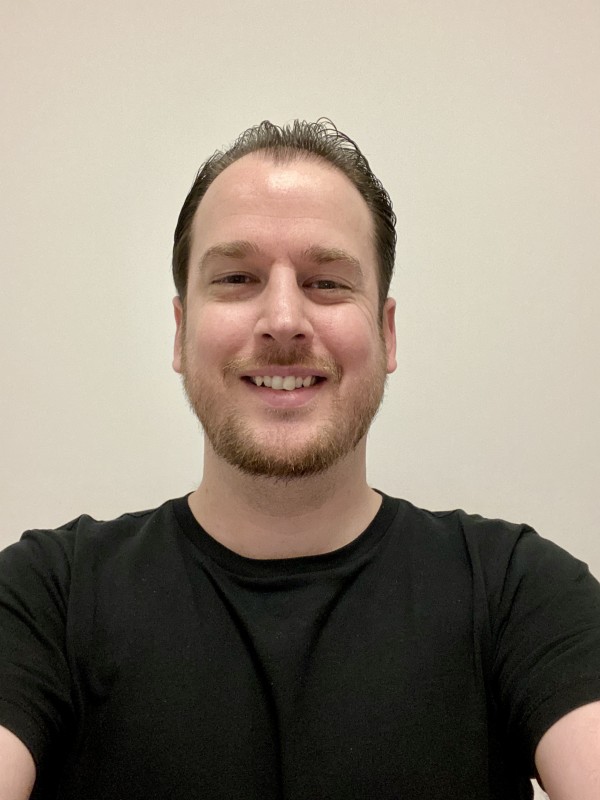
Shane White
Student - Translation and Interpreting MA
"I was pleasantly surprised by how close-knit the CTS department is and how approachable the lecturers are. Within a few weeks, I really felt like I knew almost everybody in the department, both fellow students and the teaching staff."
UK qualifications
If you are a native English speaker, we require a minimum of a 2:2 UK honours degree in one of the languages listed below or in a related subject taught in one of these languages.
Native speakers of a relevant language (from the list below) require a degree in English or a related subject. If you are a Chinese native speaker then you should apply for our Interpreting (Chinese Pathway) course. Alternative subjects will be considered by the Faculty on a case-by-case basis. Relevant work experience to be considered by the Faculty on a case-by-case basis.
The languages available in the programme (subject to demand) are:
- Arabic
- Chinese (Mandarin)
- French
- German
- Greek
- Italian
- Korean
- Norwegian
- Polish
- Portuguese
- Romanian
- Russian
- Spanish
- Swedish
- Turkish.
Other languages may be available upon request.
English language requirements
IELTS Academic (or equivalent): 6.5 overall with 6.5 in writing and speaking, and 6.0 in each other category.
These are the English language qualifications and levels that we can accept.
If you do not currently meet the level required for your programme, we offer intensive pre-sessional English language courses, designed to take you to the level of English ability and skill required for your studies here.
Selection process
Offers are made subject to a successful aptitude test.
Recognition of prior learning
We recognise that many students enter their course with valuable knowledge and skills developed through a range of ways.
If this applies to you, the recognition of prior learning process may mean you can join a course without the formal entry requirements, or at a point appropriate to your previous learning and experience.
There are restrictions for some courses and fees may be payable for certain claims. Please contact the Admissions team with any queries.
Scholarships and bursaries
Discover what scholarships and bursaries are available to support your studies.
Fees per year
Explore UKCISA’s website for more information if you are unsure whether you are a UK or overseas student. View the list of fees for all postgraduate courses.
September 2025 - Full-time - 1 year
- UK
- £10,900
- Overseas
- £21,800
- These fees apply to students commencing study in the academic year 2025-26 only. Fees for new starters are reviewed annually.
Payment schedule
- Students with Tuition Fee Loan: the Student Loans Company pay fees in line with their schedule (students on an unstructured self-paced part-time course are not eligible for a Tuition Fee Loan).
- Students without a Tuition Fee Loan: pay their fees either in full at the beginning of the programme or in two instalments as follows:
- 50% payable 10 days after the invoice date (expected to be October/November of each academic year)
- 50% in January of the same academic year.
- Students on part-time programmes where fees are paid on a modular basis: cannot pay fees by instalment.
- Sponsored students: must provide us with valid sponsorship information that covers the period of study.
The exact date(s) will be on invoices.
Funding
You may be able to borrow money to help pay your tuition fees and support you with your living costs. Find out more about postgraduate student finance.
Apply online
To apply online first select the course you'd like to apply for then log in.
Select your course
Choose the course option you wish to apply for.
Sign in
Create an account and sign into our application portal.
Please note that we may have to close applications before the stated deadline if we receive a high volume of suitable applications. We advise you to submit your application as soon as it is ready.
ApplyAdmissions information
Once you apply, you can expect to hear back from us within 14 days. This might be with a decision on your application or with a request for further information.
Our code of practice for postgraduate admissions policy explains how the Admissions team considers applications and admits students. Read our postgraduate applicant guidance for more information on applying.
About the University of Surrey
Need more information?
Contact our Admissions team or talk to a current University of Surrey student online.
Terms and conditions
When you accept an offer to study at the University of Surrey, you are agreeing to follow our policies and procedures, student regulations, and terms and conditions.
We provide these terms and conditions in two stages:
- First when we make an offer.
- Second when students accept their offer and register to study with us (registration terms and conditions will vary depending on your course and academic year).
View our generic registration terms and conditions (PDF) for the 2024/25 academic year, as a guide on what to expect.
Disclaimer
This online prospectus has been published in advance of the academic year to which it applies.
Whilst we have done everything possible to ensure this information is accurate, some changes may happen between publishing and the start of the course.
It is important to check this website for any updates before you apply for a course with us. Read our full disclaimer.
